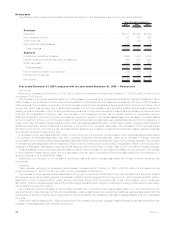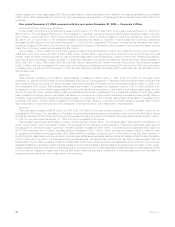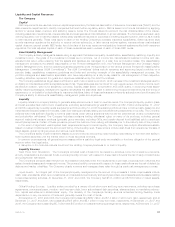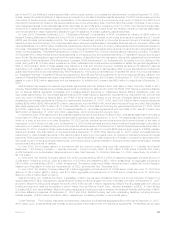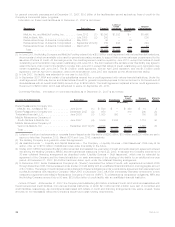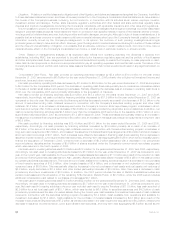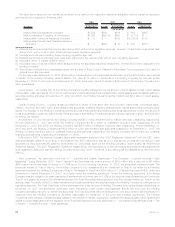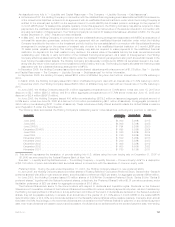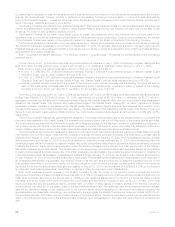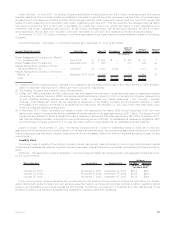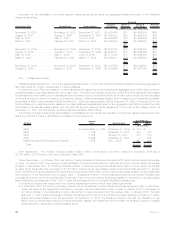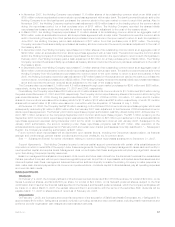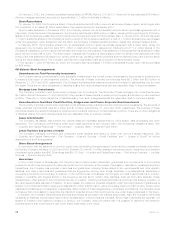MetLife 2007 Annual Report Download - page 52
Download and view the complete annual report
Please find page 52 of the 2007 MetLife annual report below. You can navigate through the pages in the report by either clicking on the pages listed below, or by using the keyword search tool below to find specific information within the annual report.difference, as well as differences in assumptions, most significantly mortality, between the date the liabilities were initially established
and the current date.
For the majority of the Company’s insurance operations, estimated contractual obligations for future policyholder benefits and
policyholder account balance liabilities as presented in the table above are derived from the annual asset adequacy analysis used
to develop actuarial opinions of statutory reserve adequacy for state regulatory purposes. These cash flows are materially repre-
sentative of the cash flows under generally accepted accounting principles.
Actual cash payments to policyholders may differ significantly from the liabilities as presented in the consolidated balance sheet and
the estimated cash payments as presented in the table above due to differences between actual experience and the assumptions used
in the establishment of these liabilities and the estimation of these cash payments. See “— Liquidity and Capital Resources — The
Company — Asset/Liability Management.”
(2) Policyholder account balances include liabilities related to conventional guaranteed investment contracts, guaranteed investment
contracts associated with formal offering programs, funding agreements, individual and group annuities, total control accounts, bank
deposits, individual and group universal life, variable universal life and company-owned life insurance.
Included within policyholder account balances are contracts where the amount and timing of the payment is essentially fixed and
determinable. These amounts relate to policies where the Company is currently making payments and will continue to do so, as well as
those where the timing of the payments has been determined by the contract. Other contracts involve payment obligations where the
timing of future payments is uncertain and where the Company is not currently making payments and will not make payments until the
occurrence of an insurable event, such as death, or where the occurrence of the payment triggering event, such as a surrender of or
partial withdrawal on a policy or deposit contract, is outside the control of the Company. The Company has estimated the timing of the
cash flows related to these contracts based on historical experience as well as its expectation of future payment patterns.
Excess interest reserves representing purchase accounting adjustments of $794 million have been excluded from amounts presented
in the table above as they represent an accounting convention and not a contractual obligation.
Amounts presented in the table above represent the estimated cash payments to be made to policyholders undiscounted as to interest
and including assumptions related to the receipt of future premiums and deposits; withdrawals, including unscheduled or partial
withdrawals; policy lapses; surrender charges; annuitization; mortality; future interest credited; policy loans and other contingent
events as appropriate to the respective product type. Such estimated cash payments are also presented net of estimated future
premiums on policies currently in-force and gross of any reinsurance recoverable. For obligations denominated in foreign currencies,
cash payments have been estimated using current spot rates.
The sum of the estimated cash flows shown for all years in the table of $212.0 billion exceeds the liability amount of $137.3 billion
included on the consolidated balance sheet principally due to the time value of money, which accounts for at least 80% of the
difference, as well as differences in assumptions between the date the liabilities were initially established and the current date. See also
comments under footnote 1 regarding the source and uncertainties associated with the estimation of the contractual obligations related
to future policyholder benefits and policyholder account balances.
(3) Other policyholder liabilities is comprised of other policyholder funds, policyholder dividends payable and the policyholder dividend
obligation. Amounts included in the table above related to these liabilities are as follows:
(a) Other policyholder funds includes liabilities for incurred but not reported claims and claims payable on group term life, long-term
disability, LTC and dental; policyholder dividends left on deposit and policyholder dividends due and unpaid related primarily to
traditional life and group life and health; and premiums received in advance. Liabilities related to unearned revenue of $2.0 billion
have been excluded from the cash payments presented in the table above because they reflect an accounting convention and not a
contractual obligation. With the exception of policyholder dividends left on deposit, and those items excluded as noted in the
preceding sentence, the contractual obligation presented in the table above related to other policyholder funds is equal to the
liability reflected in the consolidated balance sheet. Such amounts are reported in the less than one year category due to the short-
term nature of the liabilities. Contractual obligations on policyholder dividends left on deposit are projected based on assumptions
of policyholder withdrawal activity.
(b) Policyholder dividends payable consists of liabilities related to dividends payable in the following calendar year on participating
policies. As such, the contractual obligation related to policyholder dividends payable is presented in the table above in the less
than one year category at the amount of the liability presented in the consolidated balance sheet.
(c) The nature of the policyholder dividend obligation is described in Note 9 of the Notes to Consolidated Financial Statements.
Because the exact timing and amount of the ultimate policyholder dividend obligation is subject to significant uncertainty and the
amount of the policyholder dividend obligation is based upon a long-term projection of the performance of the closed block,
management has reflected the obligation at the amount of the liability presented in the consolidated balance sheet in the more than
five years category. This was done to reflect the long-duration of the liability and the uncertainty of the ultimate cash payment.
(4) Amounts presented in the table above for short-term debt, long-term debt, collateral financing arrangements, junior subordinated debt
securities and shares subject to mandatory redemption differ from the balances presented on the consolidated balance sheet as the
amounts presented in the table above do not include premiums or discounts upon issuance or purchase accounting fair value
adjustments. The amounts presented above also include interest on such obligations as described below.
Short-term debt consists principally of 90-day commercial paper, with a remaining maturity of 54 days, and carries a variable rate of
interest. The contractual obligation for short-term debt presented in the table above represents the amounts due upon maturity of the
commercial paper plus the related variable interest which is calculated using the prevailing rates at December 31, 2007 through the
date of maturity without consideration of any further issuances of commercial paper upon maturity of the amounts outstanding at
December 31, 2007.
Long-term debt bears interest at fixed and variable interest rates through their respective maturity dates. Interest on fixed rate debt was
computed using the stated rate on the obligations through maturity. Interest on variable rate debt is computed using prevailing rates at
December 31, 2007 and, as such, does not consider the impact of future rate movements.
Collateral financing arrangements bear interest at fixed and variable interest rates through their respective maturity dates. Interest on
fixed rate debt was computed using the stated rate on the obligations through maturity. Interest on variable rate debt is computed using
prevailing rates at December 31, 2007 and, as such, does not consider the impact of future rate movements.
48 MetLife, Inc.


